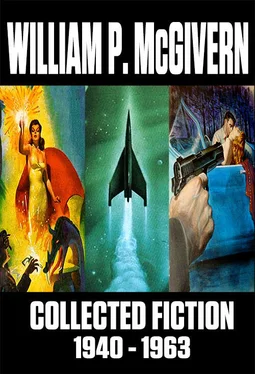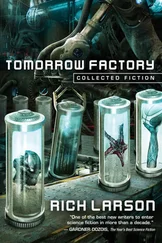Уильям Макгиверн - Collected Fiction - 1940-1963
Здесь есть возможность читать онлайн «Уильям Макгиверн - Collected Fiction - 1940-1963» весь текст электронной книги совершенно бесплатно (целиком полную версию без сокращений). В некоторых случаях можно слушать аудио, скачать через торрент в формате fb2 и присутствует краткое содержание. Год выпуска: 2014, Издательство: Jerry eBooks, Жанр: Ужасы и Мистика, Фантастика и фэнтези, Детектив, Прочие приключения, на английском языке. Описание произведения, (предисловие) а так же отзывы посетителей доступны на портале библиотеки ЛибКат.
- Название:Collected Fiction: 1940-1963
- Автор:
- Издательство:Jerry eBooks
- Жанр:
- Год:2014
- ISBN:нет данных
- Рейтинг книги:3 / 5. Голосов: 1
-
Избранное:Добавить в избранное
- Отзывы:
-
Ваша оценка:
- 60
- 1
- 2
- 3
- 4
- 5
Collected Fiction: 1940-1963: краткое содержание, описание и аннотация
Предлагаем к чтению аннотацию, описание, краткое содержание или предисловие (зависит от того, что написал сам автор книги «Collected Fiction: 1940-1963»). Если вы не нашли необходимую информацию о книге — напишите в комментариях, мы постараемся отыскать её.
Collected Fiction: 1940-1963 — читать онлайн бесплатно полную книгу (весь текст) целиком
Ниже представлен текст книги, разбитый по страницам. Система сохранения места последней прочитанной страницы, позволяет с удобством читать онлайн бесплатно книгу «Collected Fiction: 1940-1963», без необходимости каждый раз заново искать на чём Вы остановились. Поставьте закладку, и сможете в любой момент перейти на страницу, на которой закончили чтение.
Интервал:
Закладка:
“There is one thing, Miss Stevens,” he said, smiling.
“Yes?”
Miss Stevens was an extremely attractive young woman. She was tall, excellently built, and her eyes were very blue and direct.
“I was wondering, that is, it occurred to me, if you would have dinner with me tonight,” Caesar said. He didn’t sound very optimistic, despite his smile. This was not the first time he had asked Miss Stevens to dinner.
“I’m sorry, Mr. Simon, but it just isn’t possible,” she said. She didn’t sound very sorry, actually. Miss Stevens didn’t like Caesar, and she heartily wished he would take her consistent refusals of his invitations as an indication of her feelings. Miss Stevens didn’t like the way Caesar looked at her, for one thing. If she leaned toward him — and he always sat deep in his chair to make her do this — his eyes always slid to a spot several inches below the base of her throat. If she bent to pick up a paper, or straightened her skirt, or checked the seams of her stockings, she’d always find Mr. Simon staring at her, his protruding eyes glinting brightly, his full lips moist and slightly parted. He never made a direct pass at her, but the dozens of casual, tactile contacts he engineered each day were infinitely worse. They made her feel a reluctant partner to some lecherous relationship that Mr. Simon was pursuing mentally. The idea that Mr. Simon thought about her intimately was enough to make her squirm.
“Some other lucky chap, eh?” Mr. Simon said with ponderous levity.
“No. I have other plans, though,” Miss Stevens said.
Caesar smiled gently, trying to appear casual and goodhumored, but inwardly he raged. Why did he tolerate her contempt? Why didn’t he force her to recognize his power? He could fire her with a snap of his fingers. He could probably keep her from working again in this city. A word would do it: “Pleasant girl but, well, she’s not the sort for a bank. You know, plenty of temptation there with loose money lying about...” That would do it, but Caesar knew in his heart he would never resort to this step. The thing was he wanted to see her every day, he wanted to know when he woke in the morning that he could hurry to work and find her at her desk, trim, efficient and lovely. He would put up with her contempt for that pleasure, unsatisfactory and insubstantial though it was.
“Well, some other time then,” he said.
Miss Stevens smiled briefly and started for the door. She stopped though, turned back, and said, “I forgot, Mr. Simon. There’s a man waiting to see you. I told him he would need an appointment, but he insisted on staying.”
“What’s his business?”
Miss Stevens smiled, a genuine smile, and Caesar warmed to it. “He says he’s invented a time machine,” Miss Stevens said. “He needs a loan to build a full-scale model.”
Caesar smiled, too, happy to share a joke with Miss Stevens. “Time machine, eh? Dear me. Please send him away as gently as possible.”
“Yes, sir.”
She turned to the door and Caesar glanced, automatically, unconsciously, to the picture of the Colosseum. He caught his breath sharply, as a thought struck him. Supposing...
“Miss Stevens!”
“Yes, sir.”
“Send the man in, please,” Caesar said. He colored under Miss Stevens’ astonished expression. He laughed. “Might be fun to hear his story,” he said.
“Of course, sir.”
Caesar admired the backs of her slim straight legs as she left his office. and then he sighed and his momentary elation departed. He was behaving foolishly. Wasting his time.
The man who came in a few seconds later appeared surprisingly normal. He was in his fifties, had gray hair and alert, intelligent eyes, and was dressed conventionally in a blue business suit.
“Mr. Simon, my name is John Kirkpatrick,” he said.
“Please sit down,” Caesar said.
“Thank you. It’s good of you to see me.”
Caesar leaned back in his chair and studied Mr. Kirkpatrick with interest. “You’ve invented a time machine, I believe,” he said.
“That’s right. However, I need capital and—”
“We’ll come to that in due time,” Caesar said. “Let me hear about your machine first.”
“Of course.”
An hour later Miss Sevens entered the office. Caesar sat alone at his desk, frowning thoughtfully at a picture on the wall.
“Mr. Kirkpatrick left his telephone number with me,” she said. “Shall I keep it?”
“What? Oh. No, that won’t be necessary. I have his address.” Caesar blinked at her, hardly aware of what he had been saying. He cleared his throat and shifted some papers about on his desk. “The man’s a crackpot, of course. Absolute crackpot.”
That night at eight o’clock, Caesar sat in John Kirkpatrick’s stuffy, poorly furnished room. He was breathing heavily. “Very well,” he said. “Very well. You’ve convinced me. I’ll advance you the necessary money.”
Kirkpatrick sighed and ran a hand through his hair. “I frankly never thought I’d hear those words, Mr. Simon,” he said, smiling. “You really mean you’ll help me arrange a loan with your bank?”
“I will advance the money personally.” Caesar had determined in his two talks with Kirkpatrick that the man was as guileless as a child about matters of finance. He was a genius, a pure and true genius in theoretical physics, but he didn’t know the difference between a call loan and a check book.
“I’m really amazed at your confidence,” Kirkpatrick said.
“There are some strings to it,” Caesar said. “First, absolute secrecy. Do you agree to that?”
“Certainly.”
“Two. When the machine is completed we will check it ourselves before making any announcement to the press.”
“That’s perfectly agreeable to me.”
“Good. I will establish an account for you at the Merchants Bank tomorrow morning. I will deposit ten thousand dollars in your name.
“Then I can start, I can start,” Kirkpatrick said exultantly. “No more models of glass, no more guessing and hoping. I can really start.”
“When will you have the machine completed?”
“A month, perhaps two,” Kirkpatrick said. He rose and began to pace the floor, seemingly unable to control his excitement and pleasure. “Mr. Simon, you really don’t know the magnitude of your help. Not to me, of course. I’m nothing at all. But the whole world will be in your debt. We can travel to the future, learn their discoveries in medicine and science, and bring them back to our own time. We can travel in the past and right gross wrongs, by bringing with us the testimony that has come to light since the injustices were committed.
“Think of that! The Dreyfus case, Sacco and Vanzetti, the Salem burnings — all of those events may be re-enacted and reassessed with new knowledge, new evidence.” He stopped before Caesar Simon, who was staring up at him with a small, careful smile on his round blank face. “You can hardly believe it, I know,” Kirkpatrick said. “But there is no limit to the good my machine can do. Think of the horror and cruelty of the past. The Roman gladiatorial games, the senseless persecution of religious minorities. We can change all that now. We can go back and show those people their mistakes, their sins against God and Humanity.”
“Oh, yes, we can go back there,” Caesar Simon said, and there was still the small, careful smile on his face. He stood up and reached for his hat. “That will be most... ah... interesting. Good night, Mr. Kirkpatrick. Step by at my office ” Caesar paused.
“No, I’ll meet you at the Merchants Bank, on second thought. Ten o’clock sharp.”
Caesar returned to his routine at the bank, but beneath his serene exterior there was a drumming, almost unbearable excitement. Each Saturday morning he took a train out to the small laboratory Kirkpatrick had rented in the country. There he stared at plans, metals, instruments and precision tools, with a small, careful smile. He watched the machine take form, grow into an oddly fluid, shimmering metal globe. Kirkpatrick worked like a slave, sleeping on his desk in snatches of an hour or so, and then returning to his drawing boards and laths, pale, tired, but burning with an unquenchable spirit and energy.
Читать дальшеИнтервал:
Закладка:
Похожие книги на «Collected Fiction: 1940-1963»
Представляем Вашему вниманию похожие книги на «Collected Fiction: 1940-1963» списком для выбора. Мы отобрали схожую по названию и смыслу литературу в надежде предоставить читателям больше вариантов отыскать новые, интересные, ещё непрочитанные произведения.
Обсуждение, отзывы о книге «Collected Fiction: 1940-1963» и просто собственные мнения читателей. Оставьте ваши комментарии, напишите, что Вы думаете о произведении, его смысле или главных героях. Укажите что конкретно понравилось, а что нет, и почему Вы так считаете.

![Уильям Макгиверн - Завтра опять неизвестность [английский и русский параллельные тексты]](/books/35168/uilyam-makgivern-zavtra-opyat-neizvestnost-angli-thumb.webp)









